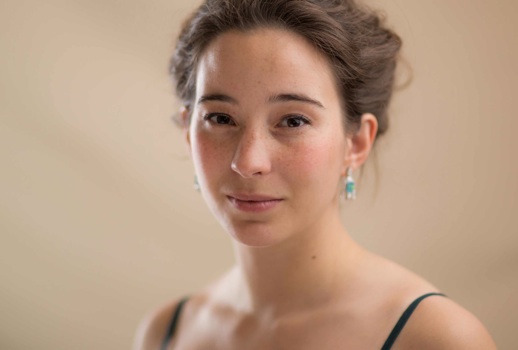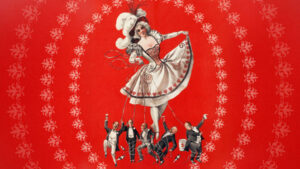 Other than Israel in Egypt and Messiah, Handel’s English oratorios aren’t all that different from his operas—characters under duress trading da capo arias—except for all those choruses. But what choruses! William Christie’s Les Arts Florissants made a much-anticipated appearance at Lincoln Center’s White Light Festival Saturday performing Theodora and the always stellar group reveled in that demanding work’s magnificent choruses transforming them into the highpoints of an otherwise oddly unmoving evening.
Other than Israel in Egypt and Messiah, Handel’s English oratorios aren’t all that different from his operas—characters under duress trading da capo arias—except for all those choruses. But what choruses! William Christie’s Les Arts Florissants made a much-anticipated appearance at Lincoln Center’s White Light Festival Saturday performing Theodora and the always stellar group reveled in that demanding work’s magnificent choruses transforming them into the highpoints of an otherwise oddly unmoving evening.
Despite all the talk of Theodora being rarely performed, this is third performance I’ve attended in less than three years, including one at Carnegie Hall by The English Concert in February 2014.
It’s likely that the piece’s current popularity can be traced back to Christie’s encounter with the work at the 1996 Glyndebourne Festival. Peter Sellars’s revelatory production there (blessedly still available in both audio and video
formats) with the splendid all-American group of Dawn Upshaw, an incandescent Lorraine Hunt Lieberson, David Daniels and Richard Croft went a long way to show just how dramatic and moving Handel’s oratorio about Christian martyrdom can be. In 2000 Christie recorded the work with Les Arts Florissants—it has just been reissued
by Erato—after a tour which included a memorable visit to the Brooklyn Academy of Music.
Beginning with a series of concerts in 2009 of Susanna, Christie has been lately much preoccupied with Handel’s oratorios, including conducting the early Italian ones here in New York with Juilliard 415.
Unfortunately the Les Arts Florissants performances of the English works have sometimes been compromised by less than ideal soloists, a problem that plagued this Theodora, which was also grievously cut. No numbers were omitted but many da capo repeats were excised, presumably to reduce its considerable running time—the Erato recording runs 178 minutes. The Alice Tully Hall concert did end in roughly three hours including a 20+ minute intermission, but those abridgements severely unbalanced the work—an ear repeatedly denied the da capo repeat it expected was startled when one actually arrived.
Mercifully all the thrilling choruses were performed complete. As in the Jephtha I heard in Paris and the Belshazzar on CD, the Les Arts Florissants choir remains one of today’s great Handel glories. The 25-member group performed without scores and particularly relished its unusual opportunity in Theodora to portray two very different crowds, the “Heathens” and the Christians. The men loudly mocked Theodora’s initial sentence to be a prostitute in a riotously raucous “Venus, laughing from the skies,” while the entire group attained the sublime in the extraordinary chorus of resurrection “He saw the lovely youth” that concludes the second part.
If anyone today who still scoffs at period instruments, he has not lately heard the LAF band which on Saturday played with such a lush and lustrous sound that one might have thought it was the Vienna Philharmonic instead onstage. That so many have played together for so long surely contributes to their enviable unanimity: exemplary harpsichordist Béatrice Martin, continuo cellist and bassist David Simpson and Jonathan Cable and the eloquent flutist and oboist Serge Saïtta and Pier Luigi Fabretti were all veterans of that first LAF Theodora fifteen years ago!
Unfortunately, the all-important soloists were not quite as exemplary with the exception of young Callum Thorpe as Valens, the strutting governor of Antioch. A veteran of the 2011 edition of LAF’s young artist training program Le Jardin de Voix, Thorpe sang with a full, focused bass delighting in his villainy while dispatching his demanding coloratura with bravura verve.
Another Jardin de Voix alumna from the 2009 class, Katherine Watson was the pious, virginal Theodora. As with her Iphis in the 2011 Jephtha, I was again disappointed by her pale, superficial portrayal of one of Handel’s most moving heroines. While she acted earnestly, her girlish soprano only occasionally glowed on top, its anemic middle and lower registers grated. The solo prison scene, one of Handel’s great inspirations, failed to make much of an impact; she did improve in the third part, particularly in “When sunk in anguish and despair.” It was difficult not to long for Karina Gauvin or Carolyn Sampson, two recent, radiant exemplars of the title role.
The Croatian tenor Kresimir Spicer first came to prominence in 2000 when he starred in the title role of Les Arts Florissants’s production of Monteverdi’s Il Ritorno d’Ulisse in Patria. At the time much was made in the press about him and the Penelope, his then-wife the Serbian contralto Marjana Miljanovic. Her star quickly rose and then just as quickly fell and I haven’t heard anything of her for years. He has been the steadier singer, recently replacing an absent Rolando Villazon at La Scala in the title role of Mozart’s Lucio Silla.
Fondly remembered for his appealing nobility in the Ulisse when it traveled to the Brooklyn Academy of Music, Spicer remains an attractive and communicative artist but I don’t think he’s much suited to Handel. The role of the vacillating Roman officer Septimius contains some of the composer’s most challenging music for tenor and though Spicer pleased in the more lyrical pages, more than once the demanding florid writing nearly defeated him. By his final aria, he was only able to negotiate high notes by punching them out, violently disturbing Handel’s smooth line.
The bewitching French mezzo Stéphanie d’Ourstrac made a rare US appearance as Theodora’s confidant. She has been an excitingly volatile presence in the recent Les Arts Florissants production of Lully’s Armide and Atys
(although she unfortunately did not take part in the New York tour), but Handel’s serene and devoted Irene didn’t appear to be her role.
Although I hadn’t heard her live since 2006 when she sizzled in LAF’s miraculous production of Rameau’s Les Paladins in Paris, I have always thought of her a high mezzo, but there have been many performances of Carmen since then. Her exciting temperament occasionally flashed in the recitatives, but Irene’s quietly reverent arias seemed to stifle her, particularly in part one. An intensely rapt “Defend her, Heav’n” glowed, but I couldn’t help feeling that the role was just too low (and passive) for her.
Philippe Jaroussky last appeared in New York with Les Arts Florissants in 2007 in the title role of its production of Landi’s Il Sant’Alessio. In the meantime he’s remained one of the world’s most sought-after countertenors with an ever-growing Erato catalog of recordings and sold-out solo concerts worldwide.
His singing, though, has become increasingly mannered, and his patented “heartfelt” performing style—intently knit brow with closed eyes and open palms—was much on display as Didymus, the love-struck Roman who sacrifices himself either for his newly found Christianity or his love for Theodora or both.
At this best, Jaroussky can still be fiercely moving but much of his music on Saturday seemed to lie awkwardly for his high countertenor, repeatedly pushing him into his weaker middle and lower registers. He also suffered more than anyone from the cuts that denied him the opportunity to carefully build his arias through their intended ABA progression. His—and Watson’s—finest moment came at the end in the transporting “Streams of pleasure” where the doomed lovers anticipate their imminent doom in music of ravishing sensuality.Perhaps Jaroussky’s newest Handel role as Arsace in Partenope opposite Gauvin in a new recording to be released in the US in several weeks will suit him better.
That the singers of Theodora seemed so poorly matched was odd since they had just given six staged performances at the Théâtre des Champs-Élysées in Paris. Those were given without the disfiguring musical cuts that marred the New York concerts, and since Stephen Langridge’s production was televised in Europe it can be viewed here:One wonders which Handel oratorio might be next for Christie: Saul has long been rumored, first at Aix-en-Provence, then at Glyndebourne, but it has not yet come to pass. However, Boston’s Handel and Haydn Society will be performing Saul next spring; I don’t know all of the singers but Joélle Harvey and Iestyn Davies as Michal and David should be irresistible.
In the meantime there will be Messiahs galore, the most intriguing must be those scheduled by the Philadelphia Orchestra with an astonishing group of soloists—Gauvin, Karen Cargill, Christophe Dumaux, Andrew Staples and Matthew Rose—conducted by music director Yannick Nézet-Séguin!
Photo Credit: ©Yags Murayenko





